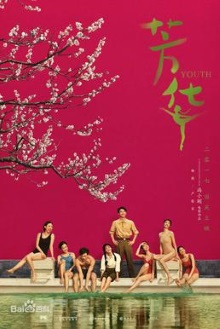
I confused myself by having two films with the same English language name released so close to one another though they are completely unlike one another. This one is a Chinese film by Feng Xiaogang who my wife notes is more of a mainstream director. Despite the plethora of awards this film racked up, it is utterly conventional and therefore uninteresting.
The story recounts the trials of an arts troupe who are all members of the People’s Liberation Army but specialize in putting up morale-boosting performances for other soldiers. Despite several of them having parents who were caught up in the Cultural Revolution, the youths of the troupe are enthusiastic and patriotic. Among them is Liu Feng, who is so kind and dutiful that he has hailed as a living icon for others. A new arrival is He Xiaoping, a girl who is bullied by the others for supposedly having bad body odor. They are as subject as anyone else to the passions of youth and Liu Feng is in love with Lin Dingding, a vain girl who doesn’t return his affections. Due to the scandal he is transferred to combat duty just as the Sino-Vietnamese War breaks out. He Xiaoping is sent to serve as a nurse as well when she becomes disaffected with the troupe. Meanwhile the others continue to serve and perform until the troupe is disbanded just as China begins opening up.
The film opens with a voiceover by Xiao Suizi, a troupe member who continues to provide narration throughout. She claims that Liu Feng and Lin Dingding are the main characters of the story but that turns out to be misleading as the film really wants to talk about the troupe as a whole. The director banks heavily on nostalgia and shared camaraderie as the troupe passes from the pre-reform era to modern China and the scenes of them being teary eyed as they go their separate ways after more than a decade of serving are effective albeit not truly earned. At the same time, the director wants to tell the stories of those two even after they leave the troupe as their experiences during the war are much more exciting than that of the other members. Then we have the two nominally good but downtrodden characters of the story who serve faithfully but fare poorly in the new China. It’s a very hamfisted way of going about things but it could work if not for the way that the focus drifts all over the place and conflates unrelated themes.
The film does have its moments. My favorite scene is when they discover the music of Teresa Teng. It’s a magical moment that crystalizes the passing of an era and their acknowledgment that there is a wider world outside of China. Though I’m sure that it was unintentional on the part of the director, it also shows up the meaninglessness of the patriotic shows that they themselves put on. But most of the scenes are crap. For example, it spends a lot of time and what must have been a sizable budget on a battle scene. It’s technically good but narratively empty and affects only one character. The worst part of the film is that it consistently makes the most predictable and traditional choices, so that we know Liu Feng will lose an arm, that he and He Xiaoping will end up being poor. This is a film that lacks any artistic courage whatsoever and assiduously avoids all controversy, such as what the characters think about the war with Vietnam or how the other troupe members feel about modern China given that they seem to be doing well yet it is completely at odds with the values of the Cultural Revolution during which they bonded together.
This is apparently adapted from a novel and of course I have no idea how good the original source material is. The premise seems sound to me but I would have loved to see a talented director helming such a project. This however is a poor effort that is not worth your time.